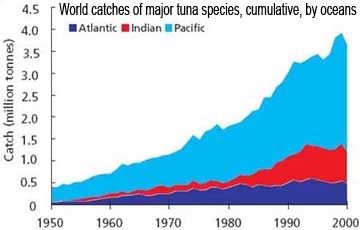Greenpeace ship attacked by Turkish tuna fishermen during protest
Greenpeace ship attacked by Turkish tuna fishermen during protest
mongabay.com
May 30, 2008
|
|
Members of a Turkish tuna fishing boat attacked the Greenpeace ship Arctic Sunrise while the ship was engaged in a protest against overfishing. The incident occurred Friday in the Cypriot Channel and was reported to the Turkish Iskenderun Gulf Port Authorities.
According to the environmental group, the Cinar Ibrahim collided with the Arctic Sunrise before crew members began hurling lead fishing weights at the Greenpeace ship. Greenpeace’s helicopter was damaged and is now inoperable. The NGO says gunfire was also heard but no one was injured.
Greenpeace is campaigning for a global network of fully-protected marine reserves covering 40 percent of the world’s oceans. It says the network would help increase the resilience of oceans to climate change, restore the health of fish stocks, and protect marine life from habitat degradation.
As part of its “Defending our Mediterranean” tour, Greenpeace is in the Cypriot Channel to highlight the over-capacity in the bluefin tuna fishing fleet.
 World catches of major tuna species, cumulative, by oceans, 1950-2000. Graph courtesy of FAO. How to save the world’s oceans from overfishing Global fishing stocks are in trouble. After expanding from 18 millions tons in 1950 to around 94 million tons in 2000, annual world fish catch has leveled off and may even be declining. Scientists estimate that the number of large predatory fish in the oceans has fallen by 90 percent since the 1950s, while about one-quarter of the world’s fisheries are overexploited, depleted, or recovering from depletion. Unsustainable fishing practices like bottom-trawling and some forms of long-lining not only deplete targeted species, but net sea birds, turtles, and other marine life, while destroying delicate ecosystems like deep-sea reefs. About one quarter of global fish catch is tossed back overboard, dead or dying, as bycatch. Overfishing takes toll on Bluefin tuna Overfishing has caused dramatic shifts in bluefin tuna populations that have pushed the species closer towards extinction in some areas, reports a series of studies by the Census of Marine Life (CoML) and other researchers. In one study, published in Fisheries Research, Brian R. MacKenzie of the Technical University of Denmark and the late Ransom Myers of Dalhousie University in Canada use market records to trace the birth of the bluefin tuna fishery off Northern Europe to its collapse in the 1960s. |
“Across the Mediterranean, fleets are fishing well beyond the quota and placing the stock in severe threat of collapse,” said the group in a statement.
Greenpeace is calling on the Turkish government to support the protection of the Cypriot Channel, one of the breeding areas of bluefin tuna in the Mediterranean Sea, as a marine reserve. It has asked the Turkish government to revoke all permits for its own bluefin tuna fleet.
“Marine reserves are urgently needed to protect the future of marine life, including tuna,” said Karli Thomas, Greenpeace International Oceans Campaigner. “If we don’t protect the breeding and spawning grounds now, there will be no fish for the future. By protecting tuna, fishermen are protecting their own future.”
Greenpeace recently released Taking Tuna out of the Can: A Rescue Plan for the World’s Favourite Fish, a report with recommendations for creating a sustainable tuna fishery.